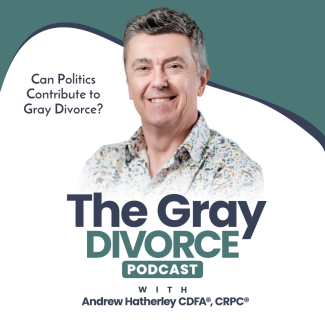
The Gray Divorce Podcast: Episode 78 Can Politics Contribute to Gray Divorce?
In this solo episode, Andrew reflects on a personal encounter at the gym that sparked a deeper look into how political discourse may be affecting relationships, particularly among older couples.
Could politics be silently fueling emotional distance, resentment, and even gray divorce?
From Gym Talk to Marital Breakdown
After overhearing two men at the gym engage in nonstop political chatter—void of joy, curiosity, or human connection—Andrew began to wonder:
Are we spending so much emotional energy on politics that we're neglecting what really matters in our personal lives?
This led to a broader discussion about how political polarization may be seeping into marriages, creating rifts between partners.
What the Research Says (and Doesn’t)
While there’s no conclusive study linking gray divorce directly to political disagreements, Andrew shares key findings:
- A Wakefield Research study found that 1 in 10 relationships ended over political disagreements, with millennials at 22%
- 22% of Americans knew a couple negatively affected post-2016 election
- Divorce attorneys report more politically-fueled tensions over the last 8–10 years
While data for older couples is limited, anecdotal evidence suggests the issue may be real—and growing.
Contempt, Not Conflict, is the Real Danger
Drawing on insights from Arthur Brooks, author of Love Your Enemies, Andrew highlights:
- Contempt—not simple disagreement—is the true relationship killer
- Sarcasm, eye-rolling, and dismissal create emotional disconnection
- Polarized media encourages “us vs. them” thinking that can bleed into personal relationships
The “Happiness 401K”: Reprioritize What Really Matters
Arthur Brooks recommends replacing political obsession with what he calls the Big Four:
- Faith (in any form of higher purpose)
- Family
- Friendship (across ideological lines)
- Meaningful Work (serving others)
This builds your Happiness 401K—a deeper investment in joy and well-being than any political allegiance can provide.
Learn to Disagree Better
Andrew offers practical advice on handling political differences in relationships:
- Break the contempt habit: Watch out for sarcasm, eye-rolling, and assumptions
- Replace judgment with curiosity and respect
- Don’t fear disagreement—fear silence and emotional distance
- Reconnect with shared values and purpose beyond politics
Final Thoughts
Instead of falling into the toxic loop of outrage and tribalism, Andrew suggests:
- Go for a walk
- Cheer on your grandkids
- Volunteer in your community
- Attend a town hall
- Or yes… go to the gym (and jog away from the pundits!)
In a world where political noise is everywhere, we need to reclaim our attention—and our relationships.
Resources
- Arthur Brooks – Love Your Enemies: www.arthurbrooks.com
- Andrew Hatherley: www.transcendretirement.net

